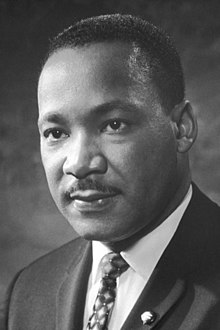
Martin Luther King Page 14
We found 106 free papers on Martin Luther King
Essay Examples
Overview
Civil Disobedience by Henry David Thoreau Analysis
Henry David Thoreau
Letter from Birmingham Jail
In 1849, Henry David Thoreau established the idea of “civil disobedience. ” In his paper “Civil Disobedience,” Thoreau encourages the reader to recognize when the government is doing something unjust and wrongful to the people. He then declares that the people should non-violently protest these actions of the government by not following the laws that…
Rhetorical Analysis of Letter from Birmingham Jail
Birmingham
Letter from Birmingham Jail
In the spring of 1963, Martin Luther King was imprisoned for peacefully protesting racial segregation in Birmingham. Religious leaders in Alabama criticized his actions as “unwise and untimely” and labeled him an “outsider.” In response, King wrote a piece called “Letter from Birmingham Jail,” defending his presence and explaining the importance of nonviolent direct action….
Analysis of Dr.King`s Speech
I Have a Dream
Speech
Dr. King’s famous “I Have a Dream” speech includes a variety of elements that make it stand out: “a calm-to-storm delivery that begins in a slow, professorial manner before swinging gradually and rhythmically to a dramatic climax; schemes of parallelism, especially anaphora (e.g., “I have a dream that . . .”); and clusters of light…
Letter to Birmingham Jail persuasive techniquess
Letter from Birmingham Jail
Techniques
In his “Letter from Birmingham Jail,” Martin Luther King Jr. employs persuasive rhetoric to address the opposing views. King employs a method similar to the Rogerian Argument, which counters human oppression. He effectively presents the issue, acknowledges the opposing viewpoint, emphasizes his own stance, supports it with evidence, and concludes with a proposal that appeals…
I Have a Dream: Rhetorical Analysis
I Have a Dream
Rhetoric
The speech was given on August 28, 1963, at the Lincoln Memorial, in a time where it was very difficult for blacks everywhere, and they wanted to change the way they were treated. The civil rights movement was becoming more and more popular at this time. Purpose: To motivate people to make a change. “I…
A Biography of Martin Luther King Jr.
Culture
I Have a Dream
Religion
Martin Luther King, Jr. was a man of recent generations who can be considered a modern-day prophet based on a wide variety of criteria. This can be seen in his “I Have a Dream” speech given at the Lincoln Memorial on August 28, 1963. To start off, in this speech, he pulled illustrations of his…
A History and Analysis of Martin Luther King’s Speech I Have a Dream
I Have a Dream
Pathos
Politics
Reverend Dr. Martin Luther King Jr. begins his “I Have a Dream” speech by identifying his subject, calling the event surrounding it a “demonstration for freedom” He mentions “freedom” throughout the speech, especially in the several “let freedom ring”s of his conclusion, which double as lyrics from an old American anthemr King chooses to mention…
| born | January 15, 1929, Atlanta, GA |
|---|---|
| description | Martin Luther King Jr. was an American Baptist minister and activist who became the most visible spokesman and leader in the American civil rights movement from 1955 until his assassination in 1968. |
| books | Chaos or Community? 1967 |
| education | School of Theology (1951–1955), Crozer Theological Seminary (1948–1951) |
| children | Martin Luther King III, Yolanda King, Dexter King, Bernice King |
| quotations | “Out of the mountain of despair, a stone of hope.” “I was a drum major for justice, peace and righteousness.” “We shall overcome because the arc of the moral universe is long, but it bends toward justice.” “Darkness cannot drive out darkness, only light can do that. |
| information | Full name: Martin Luther King, Jr. Assassinated: April 4, 1968, Memphis, TN Spouse: Coretta Scott King (m. 1953–1968) |

